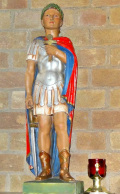
Saint Alban was the first British Christian martyr. Along with his fellow saints Julius and Aaron, Alban is one of three martyrs remembered from Roman Britain. Alban is listed in the Church of England calendar for 22 June and he continues to be celebrated in the Anglican, Catholic and Orthodox Communions.
In 2006 some Church of England clergy suggested that Alban should replace St George as the patron saint of England. There have been claims that he should be patron saint of Britain as a whole.
According to Bede's Ecclesiastical History of the English People, Alban was a pagan living at Verulamium (now St. Alban's, Hertfordshire), who converted to Christianity, and was executed by decapitation on a hill above the Roman settlement of Verulamium. St Alban's Abbey was later founded near this site.
Alban, a Roman soldier, sheltered a Christian priest in his home, and was converted and baptised by him. When Caesar Severus sent Roman Soldiers to Alban's house to look for the priest, Alban exchanged cloaks with the priest and was arrested instead. Alban was taken before the magistrate, who was furious at the deception and ordered that Alban be given the punishment due to the priest if he had indeed become a Christian. Alban declared, "I worship and adore the true and living God who created all things." These words are still used in prayer at St Alban's Abbey. St. Alban was eventually sacrificed to the Roman gods and was condemned to death.
He was taken out of the town across the River Ver. Keen for martyrdom, but with the bridge blocked with people, Alban was helped by God parting the river and he crossed to the top of the hill opposite.
The reputed place of his beheading is where St Alban's Cathedral now stands.
(Our thanks to Aaron Brooks, a pupil at Kelvin Hall School and a worshipper in our church for this article).
In 2006 some Church of England clergy suggested that Alban should replace St George as the patron saint of England. There have been claims that he should be patron saint of Britain as a whole.
According to Bede's Ecclesiastical History of the English People, Alban was a pagan living at Verulamium (now St. Alban's, Hertfordshire), who converted to Christianity, and was executed by decapitation on a hill above the Roman settlement of Verulamium. St Alban's Abbey was later founded near this site.
Alban, a Roman soldier, sheltered a Christian priest in his home, and was converted and baptised by him. When Caesar Severus sent Roman Soldiers to Alban's house to look for the priest, Alban exchanged cloaks with the priest and was arrested instead. Alban was taken before the magistrate, who was furious at the deception and ordered that Alban be given the punishment due to the priest if he had indeed become a Christian. Alban declared, "I worship and adore the true and living God who created all things." These words are still used in prayer at St Alban's Abbey. St. Alban was eventually sacrificed to the Roman gods and was condemned to death.
He was taken out of the town across the River Ver. Keen for martyrdom, but with the bridge blocked with people, Alban was helped by God parting the river and he crossed to the top of the hill opposite.
The reputed place of his beheading is where St Alban's Cathedral now stands.
(Our thanks to Aaron Brooks, a pupil at Kelvin Hall School and a worshipper in our church for this article).
